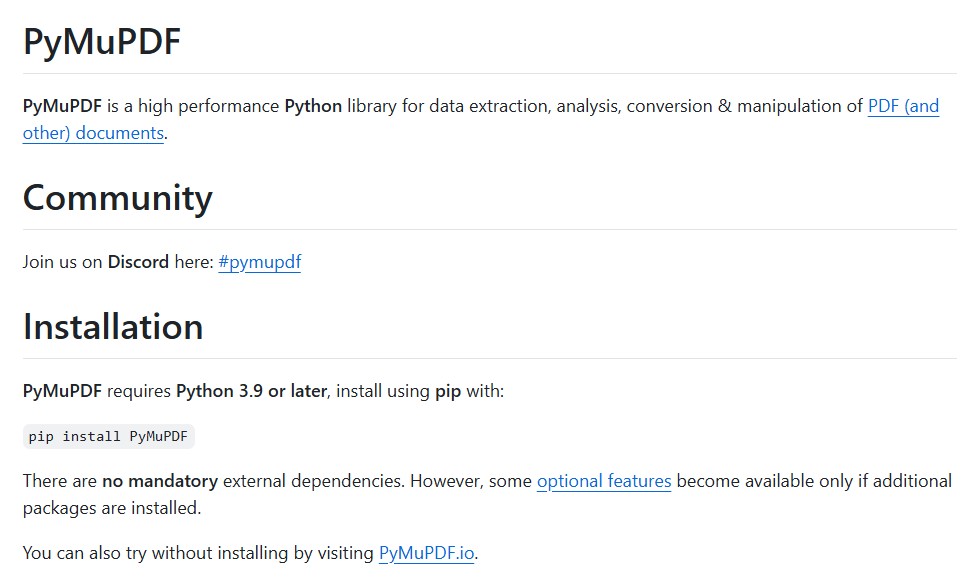If you’re a Python developer working with PDF documents whether it’s for text extraction, data analysis conversion or annotation then you’ve likely encountered the limitations of traditional tools. That’s where PyMuPDF also known as fitz, shines. It’s a lightweight, high-performance Python library that enables comprehensive PDF manipulation with minimal dependencies and maximum flexibility.

In this blog, we’ll explore what makes PyMuPDF a top choice for developers in 2025, how to install and use it and what features set it apart from other Python PDF libraries.
What is PyMuPDF?
It is a Python wrapper around MuPDF, a highly efficient open-source library developed by Artifex Software, Inc. MuPDF supports a wide variety of document formats including PDF, XPS, OpenXPS, CBZ, EPUB and more. It extends this functionality to Python offering powerful features for document processing while maintaining a lightweight footprint.
PyMuPDF is released under the AGPL-3.0 license but commercial licensing is also available through Artifex if needed.
Why Choose PyMuPDF?
When compared to other PDF libraries in Python like PyPDF2, pdfplumber or reportlab, it stands out due to:
- Speed – Extremely fast PDF rendering and text extraction.
- Accuracy – Preserves the layout and font styling during extraction.
- Flexibility – Supports annotations, image and table extraction, text shaping OCR and more.
- No mandatory dependencies – Optional packages like
Tesseract-OCRcan enhance features without being required.
Installation
It requires Python 3.9 or later. You can install it using pip:
pip install PyMuPDFThere are no mandatory external dependencies but for extended features like font embedding or OCR, you can install additional packages:
pip install fonttools
pip install pymupdf-fontsTip: For OCR, make sure you have Tesseract-OCR installed and configured.
PyMuPDF Tutorial: Getting Started
Let’s look at a simple Python script that opens a PDF and extracts plain text from every page:
import fitz
# Open the PDF
doc = fitz.open("example.pdf")
# Loop through pages and extract text
for page in doc:
text = page.get_text()
print(text)
You can also extract images, annotations or structured data (e.g., XML or JSON). For example, to extract images:
for page_index in range(len(doc)):
page = doc[page_index]
images = page.get_images(full=True)
print(f"Page {page_index + 1} contains {len(images)} images.")
Advanced Features
1. Text Extraction with Layout Preservation
It offers multiple methods to extract text:
get_text("text")– Plain text.get_text("blocks")– Extracts text in block format.get_text("dict")– Returns text as a dictionary with layout metadata.get_text("json")– Structured extraction, useful for downstream processing.
2. Image Extraction and Insertion
You can extract embedded images, modify them or even insert new images into PDFs.
3. Annotations and Redactions
It makes it easy to add, edit, or remove annotations, highlight text and even apply redactions to sensitive information.
page.add_highlight_annot(page.search_for("confidential")[0])
4. Table Extraction
While PyMuPDF doesn’t have built-in table detection like pdfplumber, its structured text extraction capabilities make it easy to build your own parser.
Use Cases
It is widely used in fields like:
- Finance – Automating data extraction from invoices or statements.
- Legal Tech – Redacting PII and annotating case documents.
- Healthcare – Extracting information from medical reports.
- AI & NLP – Preprocessing large corpora of PDFs for machine learning.
- Education – Creating custom ebook readers or educational tools.
Community and Contributions
With over 8,000 GitHub stars, 164 releases, and nearly 70,000 users, PyMuPDF is a mature, community-supported project. Contributions are welcome and the project actively supports the latest Python versions—including Python 3.14 as of the latest update.
Repository: github.com/pymupdf/PyMuPDF
Docs: pymupdf.readthedocs.io
Final Thoughts
If your project involves PDF manipulation, content extraction or document rendering, It is one of the best tools in the Python ecosystem. Its combination of speed, accuracy and simplicity makes it ideal for both beginners and advanced users.
Whether you’re building an automation script or a full-blown document analysis pipeline, It gives you the flexibility to deliver fast, reliable results with minimal overhead.
So, give it a try install PyMuPDF and start exploring the power of PDF processing in Python.
Follow us for cutting-edge updates in AI & explore the world of LLMs, deep learning, NLP and AI agents with us.
Related Reads
- Ling-1T by inclusionAI: The Future of Smarter, Faster and More Efficient AI Models
- OpenAI’s AgentKit: Transforming How Developers Build and Deploy AI Agents
- Build a Large Language Model From Scratch: A Step-by-Step Guide to Understanding and Creating LLMs
- The Little Book of Deep Learning – A Complete Summary and Chapter-Wise Overview
- DeepEval: The Ultimate LLM Evaluation Framework for AI Developers
References
Repository: github.com/pymupdf/PyMuPDF
Docs: pymupdf.readthedocs.io

5 thoughts on “PyMuPDF: The Ultimate Python Library for High-Performance PDF Processing”